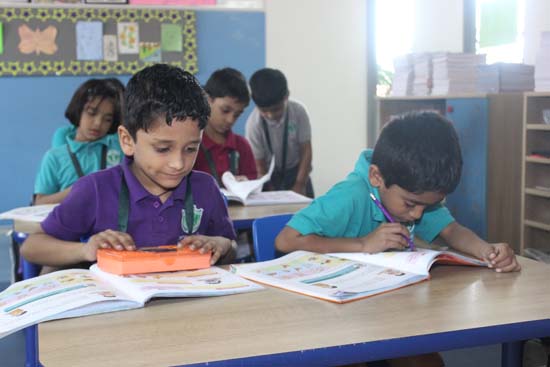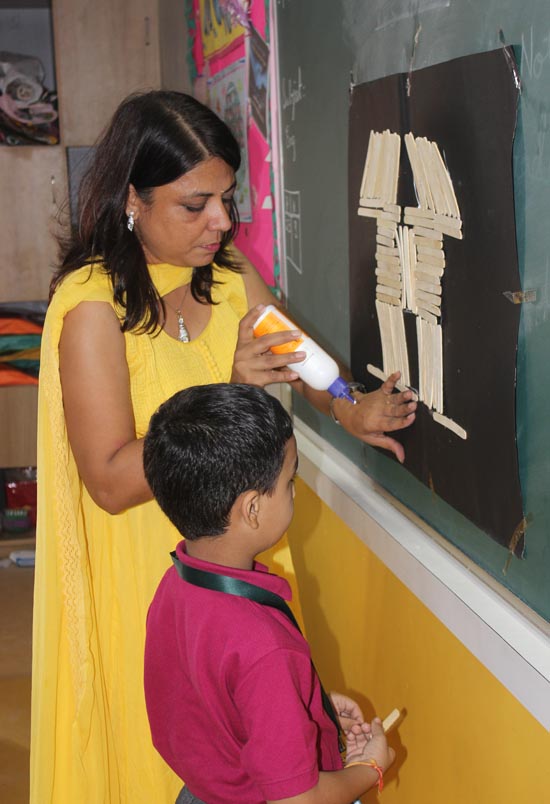primary

The Primary School recognizes the link between development and learning. Inquiry-based curriculum focuses on the child as a learner. The CCE pattern of Assessments introduced takes the students through a journey of activity based learning. The various subject activity rooms, projects, group work, role play, debates etc. lead to higher levels of learning which shift the focus from need for learning to love for learning.
PRIMARY - CLASSES III-V
-
Learning is extended into co-curricular activities like art, craft, dance, music, martial arts and yoga. Students are encouraged to play a number of sports.
-
From Class II onwards, we introduce a system of class Assessments, slowly acclimatising students to write examinations. Project based creative learning is encouraged.
-
- English
- Hindi
- Mathematics
- Nature Studies / Environmental Studies
- Social Science
- General Knowledge
- Value Education

The students are evaluated as per the CBSE guidelines. Regular Assessments are conducted to identify the learning taking place. The primary level focuses on the language development along with the 21st century skills like listening, speaking, reading and writing. The physical development in a student is observed through customised sports activities.
The learning pedagogy is integrated with
- Experiential learning
- Role play and dramatization
- Problem solving
- Emphasis on vocabulary building and language skills
- Blended learning
- Peer learning
- Demonstration
- Synchronous and asynchronous learning
- Integrated Learning
Class 3 Exam pattern
| Term | Exam | Theory | NB & Subject Enrichment | Total | Final | Term Total |
|---|---|---|---|---|---|---|
| Term 1 | Round 1 | 20 | 10+10 | 40 | 40 (Best) | 100 |
| Round 2 | 20 | 10+10 | 40 | |||
| Oral | - | - | - | 10 | ||
| Half Yearly | 50 | - | - | 50 | ||
| Term 2 | Round 3 | 20 | 10+10 | 40 | 40 (Best) | 100 |
| Round 4 | 20 | 10+10 | 40 | |||
| Oral | - | - | - | 10 | ||
| Annual Exam | 50 | - | - | 50 |
Computer:
One round exam per term of 20 marks.
Half yearly and annual exam: 30 marks.
- Notebook: 5 marks.
-Internal Practical: 25 marks.
-Activity: (2 activities) 20 marks
Total: 100 Marks converted to grades.
Marathi:
3 Activities – 30 Marks
Oral – 10 Marks.
Note Book – 10 Marks.
Total 100 – Converted to Grades.
Annual Result:
Term 1(40%) + Term 2(60%) = 100
Class 4 Exam pattern
| Term | Exam | Theory | NB + Subject Enrichment + Oral | Total | Final | Term Total |
|---|---|---|---|---|---|---|
| Term 1 | Round 1 | 20 | 5+5 +10 | 40 | 40 (Best) | 100 |
| Round 2 | 20 | 5+5 +10 | 40 | |||
| Half Yearly | 60 | - | - | 60 | ||
| Term 2 | Round 3 | 20 | 5+5 +10 | 40 | 40 (Best) | 100 |
| Round 4 | 20 | 5+5 +10 | 40 | |||
| Annual Exam | 60 | - | - | 60 |
Computer:
One round exam per term of 20 marks.
Half yearly and annual exam: 30 marks.
- Notebook: 5 marks.
-Internal Practical: 25 marks.
-Activity: (2 activities) 20 marks
Total: 100 Marks converted to grades.
Marathi:
3 Activities – 30 Marks
Oral – 10 Marks.
Note Book – 10 Marks.
Total 100 – Converted to Grades.
Annual Result:
Term 1(40%) + Term 2(60%) = 100
Class 5 Exam pattern
| Term | Exam | Theory | NB/Subject Enrichment/Oral | Total | Final | Term Total |
|---|---|---|---|---|---|---|
| Term 1 | Round 1 | 20 | 10 | 30 | 30 (Best) | 100 |
| Round 2 | 20 | 10 | 30 | |||
| Half Yearly | 70 | - | 70 | 70 | ||
| Term 2 | Round 3 | 20 | 10 | 30 | 30 (Best) | 100 |
| Round 4 | 20 | 10 | 30 | |||
| Annual Exam | 70 | - | 70 | 70 |
Computer:
One round exam per term of 20 marks.
Half yearly and annual exam: 30 marks.
- Notebook: 5 marks.
-Internal Practical: 25 marks.
-Activity: (2 activities) 20 marks
Total: 100 Marks converted to grades.
Marathi:
3 Activities – 30 Marks
Oral – 10 Marks.
Note Book – 10 Marks.
Total 100 – Converted to Grades.
Annual Result:
Term 1(40%) + Term 2(60%) = 100


